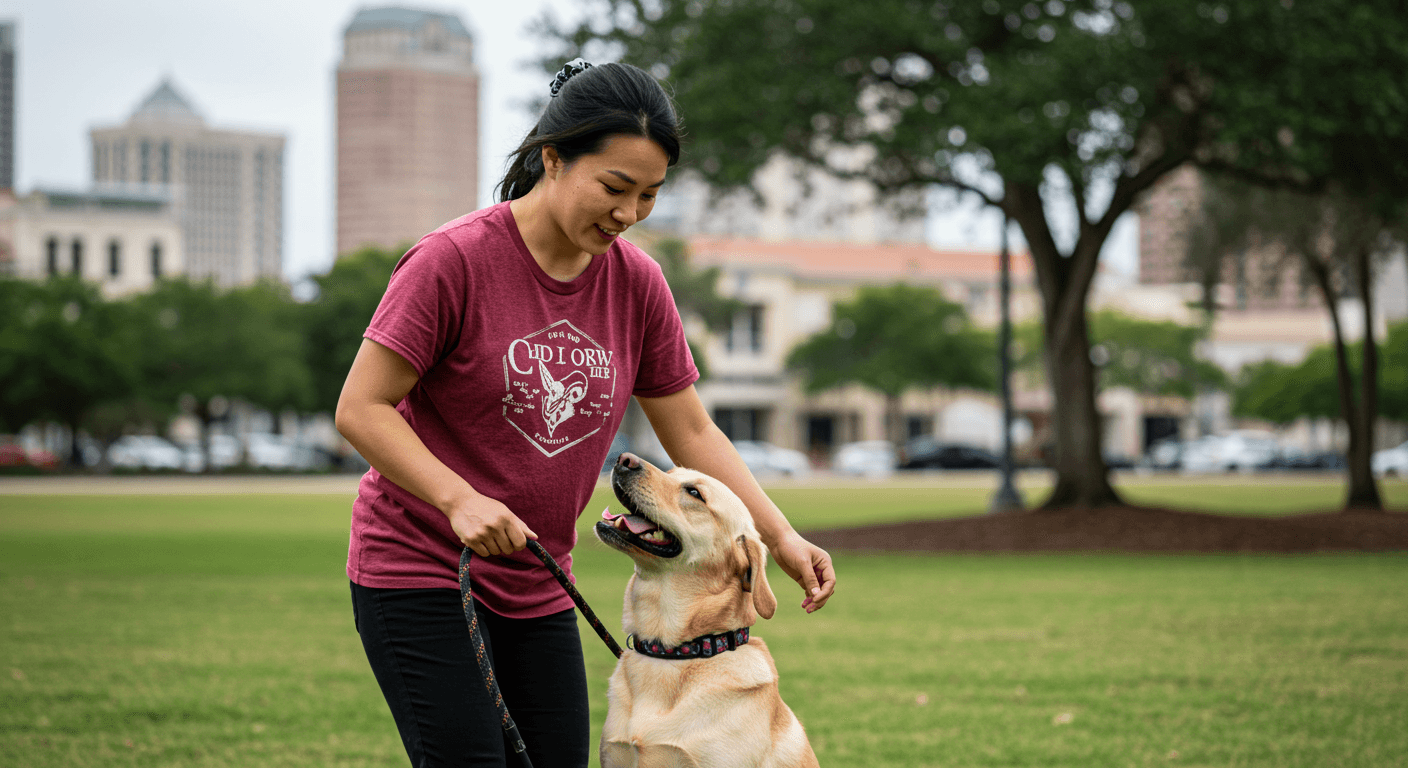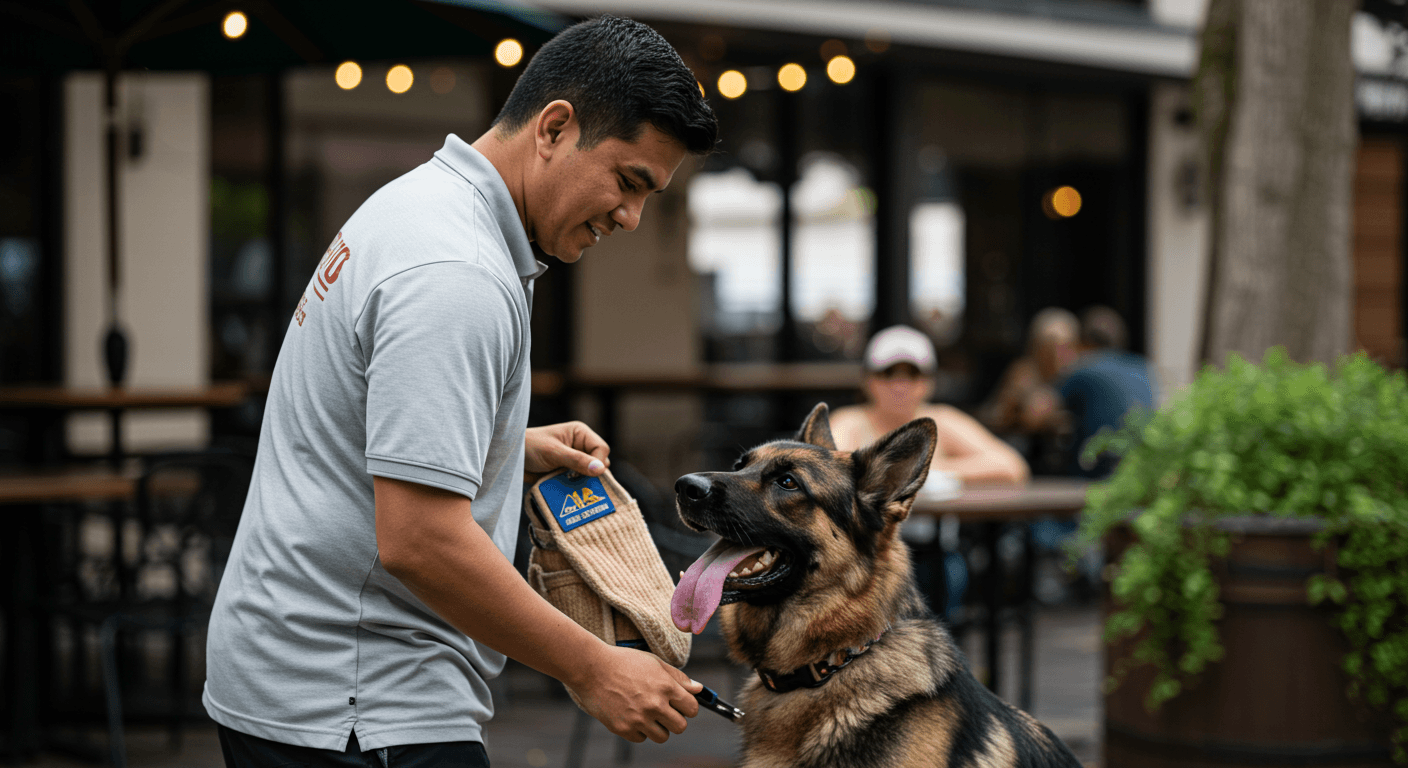Your Complete Guide to Choosing a Dog Trainer in Tampa FL
Living with a dog in Tampa means navigating busy urban parks, handling humid afternoon walks along Bayshore Boulevard, and preparing your pup for encounters with everything from cruise ship crowds near the port to waterfront dining patios in Hyde Park. Your dog needs to stay calm during encounters with wildlife near the Hillsborough River, ignore joggers on the Tampa Riverwalk, and behave politely when visiting dog-friendly breweries in Seminole Heights or Ybor City.
Since Tampa sits in Hillsborough County, you’ll follow both city and county regulations that affect where and how you train. When you find a professional dog trainer who knows these local details, you’ll get better results both at home and out in the community.
How to Choose the Right Trainer
Start by looking for someone who uses positive reinforcement training and understands the unique challenges Tampa dog owners face. Your dog should learn to walk calmly despite constant distractions, handle the busy Saturday crowd at Curtis Hixon Waterfront Park, and stay focused when encountering other dogs at Bayshore’s linear park.
Credentials help you compare trainers quickly and spot real expertise. Common dog trainer certifications include KPA-CTP, CPDT-KA, or IAABC-CDBC for behavior problems. If your dog shows serious aggression or extreme reactivity, look for someone with CBCC-KA or a science-based program like CTC.
In-home dog training works best for door manners, jumping on guests, and learning leash skills in your actual neighborhood. Group classes make sense once your dog can focus around distractions, especially before trying busier locations like the Tampa Convention Center area or Armature Works.
Ask if the trainer carries liability insurance and whether they’ll provide a free consultation to assess your dog’s needs. Finding expert dog trainers who understand Tampa’s mix of urban density and suburban sprawl makes all the difference.
Common Dog Training Methods Explained

Reward-based methods create lasting behavior changes while building the trust you need to keep your dog safe in Tampa’s busy environment. They also help you meet Hillsborough County’s requirements for keeping dogs under control in public spaces.
Basic obedience includes sit, down, stay, place, recall, and leash training so your dog can handle restaurant patios, crowded sidewalks, and park visits without pulling or jumping. These skills are essential for navigating areas like South Tampa or the busy streets around the University of Tampa.
Puppy training focuses on socialization, potty training, bite control, crate comfort, and early manners. Starting young prevents problems from forming, especially in Tampa’s high-stimulation environment where puppies encounter boats, cyclists, skateboarders, and street performers regularly.
Behavior modification addresses fear, reactivity, separation anxiety, or resource guarding through careful desensitization and counterconditioning. For serious cases, ask if your trainer collaborates with local veterinarians to rule out medical causes.
Private lessons and in-home training let you customize everything around your daily routines and specific neighborhood challenges. Day training can speed up progress when you’re short on time or dealing with complex behavior issues.
Dog training classes help your dog practice good manners around other dogs and people in controlled settings. The best group classes screen participants carefully, give dogs plenty of space, and teach calm behavior instead of excitement.
Specialized training program options like therapy dog training or service dog training require extra structure, public-access skills, and a clear step-by-step curriculum. Board and train programs can work for intensive skill-building but should always include handoff sessions so you understand how to maintain the progress at home.
Stay away from trainers who use fear, intimidation, or pain to get results. Humane dog training services are safer for everyone, easier to maintain long-term, and won’t risk complaints from neighbors or problems in public spaces.
Average Cost of Dog Training in Tampa FL (Updated for 2025)
Prices around Tampa and Hillsborough County vary based on the trainer’s experience, session length, and location. Here’s what most local pet owners are paying in 2025.
| Service Type | Average Cost (Tampa/Hillsborough County) |
|---|---|
| Puppy classes (4-6 weeks) | $160-$290 total |
| Group obedience classes (4-6 weeks) | $170-$320 total |
| Private lessons (60-90 min) | $120-$200 per session |
| In-home coaching packages (4-6 visits) | $450-$950 total |
| Day training (trainer works your dog + handoff) | $475-$1,000 per week |
| Behavior consult for reactivity/anxiety (initial) | $160-$275 |
| Board and train (2-4 weeks) | $2,200-$4,800 total |
You’ll probably pay extra travel fees if you live farther from the trainer’s home base, and expect higher rates for complex behavior work or aggressive dog training cases.
Make sure you understand what’s included in the total cost, how the trainer tracks progress, and whether training sessions include follow-up support.
Questions to Ask a Potential Dog Trainer
- What training methods do you use, and how do you keep sessions positive and low-stress?
- What credentials do you have, like KPA-CTP or CPDT-KA? Do you keep up with continuing education such as CPDT-KSA?
- How will you customize the training plan for my dog’s specific needs and our Tampa lifestyle?
- Do you offer in-home visits, group classes, or day training, and which approach fits my goals best?
- How will we measure my dog’s progress and know when to add more distractions?
- What are the total costs, including any travel fees, and what’s your cancellation policy?
- Do you carry liability insurance, and can you show me proof?
- For behavior problems, will you work with my veterinarian if needed?
- What should I practice between our sessions to help your dog keep improving?
- Do you offer a free evaluation to assess whether we’re a good fit?
Local Tampa Rules and Considerations
Tampa enforces leash laws and nuisance rules to keep parks and neighborhoods safe for everyone. Hillsborough County follows Florida’s public health requirements too.
Leashes are required in all public spaces except inside designated dog parks. Keep a standard 6-foot leash with you for the Riverwalk, Bayshore Boulevard, and any city parks or events.
Florida law requires current rabies vaccination for all dogs over four months old. You can get vaccinations through county clinics or your regular vet, and the Hillsborough County Pet Resource Center provides information on local vaccination requirements.
Excessive barking can be considered a nuisance under Tampa city code, so work with your trainer on alert barking and separation anxiety before neighbors start complaining. If your trainer wants to use city parks for commercial training sessions, they may need permits and proof of insurance.
Florida doesn’t require special licenses for dog trainers, but the state does regulate businesses that board dogs. If you choose board and train services, make sure the facility complies with Florida’s boarding kennel regulations through the Florida Department of Agriculture and Consumer Services.
Tampa dog owners should also be aware that the city prohibits dogs from certain areas like children’s playgrounds and athletic fields during organized events. Always check posted signs before entering public spaces with your dog.
Local Tampa Resources for Dog Owners
These spots give you great places to practice polite manners, work on recalls, and provide safe enrichment for your dog. Always follow posted rules and etiquette guidelines.
- Davis Islands Dog Park offers two fenced areas with separate sections for large and small dogs, plus beautiful views across the bay. Visit during quieter morning hours when you’re working on calm greetings and recall.
- Rowlett Park Dog Park in New Tampa provides a large fenced area with agility equipment, making it perfect for practicing obedience training around distractions.
- Al Lopez Park Dog Park near Tampa International Airport includes separate areas for different dog sizes and plenty of shade, which helps during Tampa’s hot months.
- The Tampa Riverwalk allows leashed dogs and provides excellent opportunities to practice loose-leash walking and focus around joggers, cyclists, and crowds.
- Hillsborough County Pet Resource Center offers low-cost vaccinations, microchipping, and other services for Tampa residents.

FAQs
How much does in-home dog training cost?
Most Tampa trainers charge $120-$200 per in-home visit, with discounts available when you buy packages of four to six sessions. Behavior problems and aggressive dog training typically start at the higher end of that range.
Is in-home dog training worth it?
Absolutely, because you’re working on problems exactly where they happen. Your trainer can fix door manners, jumping on guests, counter-surfing, and yard reactivity right at home, then step outside to practice leash training on your actual neighborhood sidewalks where your dog encounters mail carriers, delivery drivers, and neighborhood dogs.
Can you pay someone to house train your dog?
Yes, many trainers offer puppy training programs that include potty training, crate routines, and daily schedules. Day training can speed up the process while teaching you how to maintain the progress when your puppy is back home.
What is the 3-3-3 rule for dog training?
This is a helpful timeline for new or adopted dogs: expect about 3 days for your dog to decompress, 3 weeks to learn your routines, and 3 months to feel completely settled. Good training programs work with this natural adjustment period instead of rushing progress.
How long will it take to reach my training goals?
Most puppies and friendly adult dogs show solid progress within 4-8 weeks if you practice daily. Fear, reactivity, or aggression typically requires several months of careful behavior modification with gradual increases in difficulty. Tampa’s high-distraction environment may extend timelines slightly compared to quieter suburban areas.
What should I bring to group classes?
Pack a flat collar or harness, a 6-foot leash, high-value treats, water, and current vaccination records if your trainer requests them. Leave retractable leashes at home for safety reasons. Bring extra water during Tampa’s hot months.
What’s the leash law in Tampa?
Dogs must be leashed and under control in all public areas except inside designated dog parks. Tampa city code requires a leash no longer than 6 feet for all public spaces including parks, sidewalks, and the Riverwalk.
Do I need a dog license in Tampa or Hillsborough County?
Hillsborough County doesn’t require general pet licenses, but keep your dog’s rabies vaccination current and the tag on their collar. For county services, microchip information, and lost pet resources, visit the Hillsborough County Pet Resource Center.
What shots does my dog need in Hillsborough County or Florida?
Rabies vaccination is required throughout Florida for all dogs over four months old. Your veterinarian may also recommend distemper-parvo and bordetella based on your dog’s lifestyle. Check state guidelines through the Florida Department of Health.
Are dog trainers required to be licensed in Tampa or Hillsborough County or Florida?
No special trainer licenses exist in Florida. Trainers follow normal business regulations, but if they offer board and train services, their facility may need to be licensed as a boarding kennel under Florida’s Animal Welfare regulations through the Department of Agriculture.
Where can I practice off-leash recall?
Use fenced dog parks like Davis Islands Dog Park, Rowlett Park Dog Park, or Al Lopez Park Dog Park to keep things safe and legal. Try visiting during quieter hours when you’re starting out with a new training program.
Which dog parks allow training around Tampa?
All of Tampa’s city dog parks allow training within their fenced areas as long as you follow posted rules about aggressive behavior and supervision. Davis Islands, Rowlett Park, and Al Lopez Park are the most popular options with the best facilities.
What beaches or trails allow dogs for training?
Tampa doesn’t have direct beach access, but nearby Honeymoon Island State Park in Dunedin allows leashed dogs on the nature trail. Within Tampa, the Upper Tampa Bay Trail permits leashed dogs and provides miles of paved paths for leash training and socialization. Lettuce Lake Park in North Tampa welcomes leashed dogs on boardwalks and trails, offering great opportunities to practice calm behavior around wildlife and families.
How do I help my dog with separation anxiety?
Work with a certified dog trainer who specializes in behavior modification. Separation anxiety requires careful desensitization, not punishment. Your trainer will create a gradual plan that helps your dog feel safe when alone, starting with very short absences and building up slowly.
What if my dog is reactive to other dogs?
Reactivity is common in Tampa’s dense urban environment where dogs encounter each other constantly. A professional dog trainer experienced with behavior modification can help your dog learn to stay calm during these encounters. Start training at home and gradually add distractions as your dog improves.
Can I train my dog to be a well-behaved dog at restaurants?
Yes, but it requires solid basic obedience first. Your dog needs a reliable down-stay, calm behavior around food, and the ability to settle under a table for extended periods. Many Tampa trainers offer specific programs for restaurant and patio manners since the city has so many dog-friendly dining options.
The right combination of thoughtful planning, humane methods, and consistent practice around Tampa’s parks and neighborhoods will help your dog become a confident, well-behaved dog. If credentials matter to you, don’t hesitate to ask about dog trainer certifications and how your trainer stays current with new techniques.
